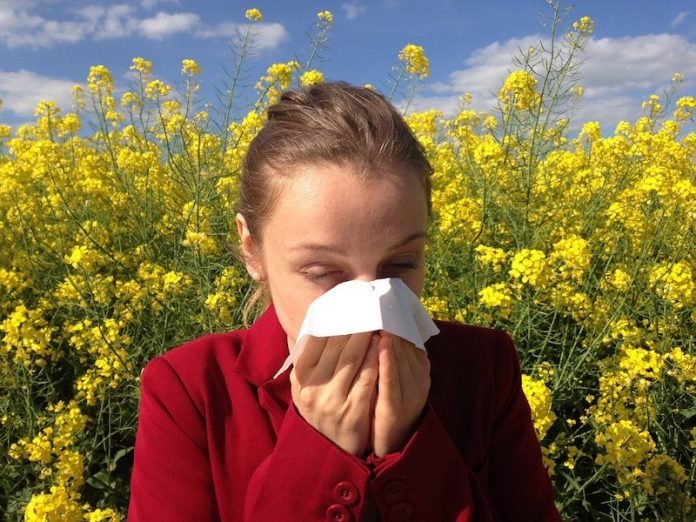
Changing seasons bring a wide range of symptoms for allergy sufferers. Learn what you need to know about relieving your seasonal allergy symptoms.
The transition between seasons can be a welcome change of scenery.
For many people, though, the weather and foliage are not the only major change that comes from shifting from summer to fall.
For some, sniffling, sneezing and watery eyes may accompany them as well.
Seasonal allergies are the body’s reaction to airborne substances. Not everyone experiences seasonal allergies, but for those who do, the symptoms can be as predictable as April showers and May flowers.
Whether you’re a long time allergy sufferer or finding yourself new to the seasonal sniffles, Mariel Benjamin, M.D., an allergy and immunology specialist at Michigan Medicine, offers answers to some frequently asked questions about seasonal allergies.
How do I know if I have seasonal allergies?
It can be tricky to distinguish if you have a common cold or seasonal allergies (also referred to as hay fever or allergic rhinitis.)
Symptoms of allergies can include:
- Sneezing
- Runny or stuffy nose
- Watery eyes
- Itchy eyes, sinuses, throat or ears
- Ear congestion
- Headache
One of the major distinguishing symptoms is itching or puffiness, which is less commonly associated with cold or respiratory virus symptoms.
If your symptoms don’t go away after a week or two, it’s pretty likely that seasonal allergies are the culprit.
Allergies can emerge at any time in your life. You often see allergy symptoms start in childhood and peak during young adulthood, but for some people, symptoms can actually disappear in later adulthood.
What causes allergies?
Depending on what you’re allergic to, your allergies may be triggered by different pollens such as tree pollen, grass pollen or weed pollen. Ragweed, for example, is a common weed pollen that bothers many allergy sufferers.
Mold spores from naturally occurring molds, like those that grow in vegetable gardens or leaf piles, can also cause allergic reactions. Even mowing the lawn can unearth mold spores and trigger symptoms for some.
Depending on what you’re allergic to, your symptoms may be worse in the fall or spring. Molds are prevalent, for example, spring through fall, whereas ragweed and other weed pollens are worse in late summer and into the fall.
If your symptoms persist year round, you may actually be dealing with an allergen in your home or other environment, such as dust or pet dander.
Do you need to know what you’re allergic to?
Knowing what you’re allergic to may be less important than remembering when your symptoms tend to flare up so you can plan ahead before symptoms really kick-in.
If you’re dealing with mild allergy symptoms, you may be able to find relief through over-the-counter therapies without knowing exactly what you’re reacting to.
For more persistent or bothersome symptoms, it can be more important to know specifically what you are allergic to.
Allergy testing in a clinic setting can help you narrow down what triggers your symptoms, what type of medications will work best for you and advice on when to take them.
You also may walk away with suggestions on things you can change in your home environment or ways to minimize issues in the future – like not rolling around in leaf piles during the fall!
Can allergies make you sick?
Severe allergies or allergies left unmanaged for long periods of time can cause additional complications. People with chronic allergies tend to get colds more often. In addition, inflamed sinuses can harbor bacteria, leading to sinus or ear infections.
It’s also not uncommon for allergy sufferers to also have asthma, resulting in more frequent asthma attacks.
How do you treat allergies?
Most allergy sufferers can find relief from over-the-counter allergy medications.
Nasal sprays or intranasal steroid sprays, such as Flonase or Nasacort, are a good first line option because side effects are minimal, consisting mostly of nasal dryness or bleeding for some people. It’s important to note that nasal sprays need to be in your system for a while before taking effect. Expect them to be in your system for up to a week before they really start to kick in.
Over-the-counter antihistamines, such as Zyrtec, Allegra or Claritin, can be a good option if nasal sprays aren’t effective or if you don’t tolerate nasal sprays well. In most cases sprays and antihistamines can be combined when symptoms are especially bad.
If you’re still struggling with symptoms after trying out some over the counter medications, it might be time to see an allergy specialist.
At your first appointment you’ll talk about your medical history and your symptoms and most patients will undergo skin testing.
Skin testing involves pricking the skin with a trace amount of different allergens and measuring the skin’s reaction after about 20 minutes. Your appointment could last a few hours, but you’ll receive definitive information about what you are allergic to, as well as a personalized treatment plan.
Your treatment could also involve prescription strength allergy medications. Select patients may be good candidates for immunotherapy, such as allergy shots, to train the body to become less responsive to allergens, minimizing symptoms and preventing the development of new allergies.
The best allergy specialists will pair your allergy test results with a thorough understanding of your lifestyle and your needs to determine what form of treatment will most effectively treat your individualized allergies.
Written by Rebecca Priest.



